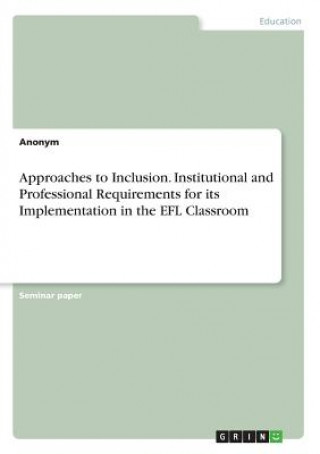
Kód: 19361972
Approaches to Inclusion. Institutional and Professional Requirements for its Implementation in the EFL Classroom
Autor Anonym
Seminar paper from the year 2016 in the subject Pedagogy - Common Didactics, Educational Objectives, Methods, grade: 1,3, University of Frankfurt (Main), language: English, abstract: When it comes to the topic inclusion, it is ver ... celý popis
- Jazyk:
 Angličtina
Angličtina - Vazba: Brožovaná
- Počet stran: 24
Nakladatelství: Grin Publishing, 2018
- Více informací o knize

Mohlo by se vám také líbit
-

Too Good To Be Trew (The Autobiography): Personal memories from a boy born in the 1950's
276 Kč -

Odd Tales of Wonder #8
252 Kč -

Early Elementary Science Education
870 Kč -

Doing Good Parenthood
1977 Kč -

La Philosophie dans le boudoir ou Les Insti- tuteurs immoraux
261 Kč -

Pelle und Pinguine - Auch ein Eisbär geht zur Schule
303 Kč -

Namaiki Zakari - Frech verliebt 08
217 Kč
Darujte tuto knihu ještě dnes
- Objednejte knihu a zvolte Zaslat jako dárek.
- Obratem obdržíte darovací poukaz na knihu, který můžete ihned předat obdarovanému.
- Knihu zašleme na adresu obdarovaného, o nic se nestaráte.
Více informací o knize Approaches to Inclusion. Institutional and Professional Requirements for its Implementation in the EFL Classroom
Nákupem získáte 100 bodů
 Anotace knihy
Anotace knihy
Seminar paper from the year 2016 in the subject Pedagogy - Common Didactics, Educational Objectives, Methods, grade: 1,3, University of Frankfurt (Main), language: English, abstract: When it comes to the topic inclusion, it is very hard to keep it simple, as the term itself carries a wide complexity and paradoxical elements. It opens up a broad field within the social, theoretical and practical contexts. Since The UN Convention on the Rights of Persons with Disabilities, inclusion became a legally binding right, and its implications within the educational system are immense. The concept of inclusive pedagogy and inclusive classroom became important to the EFL classroom. Within the seminar Inclusion and Differentiation - Methods Embracing All Students in the Modern EFL Classroom, we concentrated for the most part on practical expressions of the idea of inclusion regarding inclusive didactics and inclusive methods. As a future teacher, I am grateful for any practical tools I can use to teach prospective students in the EFL classroom. However, the question that lingers is, why should I even care about inclusive didactics and methods in the first place? What is the basis and fundamental idea behind this? For me, this paper is a search for the reason why I should consider inclusive methods. I want to take a step back and inquire about the basics of inclusion. Where does it come from? What is its history within legal rights, and what concepts are there to define the term inclusion? How did the UN Convention affect requirements that relate to institutional and professional foundations? The three main questions concern inclusion as a human right, concepts and definitions of inclusion, and the institutional and professional requirements of an inclusive school system. I will present scientific approaches and attempts to determine similarities and differences. I will start out with a selective chronological order of the legal historical declarations and conventions of inclusion, aiming to provide a basis for the definition of the term and its practical influence. The definition of the term inclusion is important to show the diversity of approaches and descriptions. I will start out with the comparison of inclusion to integration, and continue with its connection to inclusive schools and inclusive education. In the last chapter I will present structural necessities in the original form of the UN Convention and discuss requirements concerning the level of institutions and professionals.
 Parametry knihy
Parametry knihy
1004 Kč
- Plný název: Approaches to Inclusion. Institutional and Professional Requirements for its Implementation in the EFL Classroom
- Autor: Anonym
- Jazyk:
 Angličtina
Angličtina - Vazba: Brožovaná
- Počet stran: 24
- EAN: 9783668680302
- ISBN: 3668680302
- ID: 19361972
- Nakladatelství: Grin Publishing
- Hmotnost: 49 g
- Rozměry: 210 × 148 × 1 mm
- Rok vydání: 2018
Oblíbené z jiného soudku
-

Dune
262 Kč -

Haunting Adeline
617 Kč -

Berserk Deluxe Volume 2
1093 Kč -

White Nights
78 Kč -

Powerless
259 Kč -

Atomic Habits
339 Kč -

Dune Messiah
178 Kč -

Berserk Deluxe Volume 3
1138 Kč -

One Day
276 Kč -

Berserk Deluxe Volume 1
1112 Kč -

Iron Flame
352 Kč -

Surrounded by Idiots
256 Kč -

Harry Potter and the Prisoner of Azkaban (Minalima Edition)
688 Kč -

Gravity Falls Journal 3
440 Kč -

Heaven Official's Blessing: Tian Guan Ci Fu (Novel) Vol. 1
440 Kč -

The Creative Act
586 Kč -

Dune
250 Kč -

Hunting Adeline
625 Kč -

A Little Life
276 Kč -

Children of Dune
174 Kč -

Heaven Official's Blessing: Tian Guan Ci Fu (Novel) Vol. 2
441 Kč -

Bungo Stray Dogs, Vol. 8 (light novel)
367 Kč -

Percy Jackson and the Olympians 5 Book Paperback Boxed Set
953 Kč -

Solo Leveling, Vol. 1
444 Kč -

The Prisoner's Throne
231 Kč -

Court of Thorns and Roses
254 Kč -

Cry Baby Coloring Book
255 Kč -

Fourth Wing
420 Kč -

Icebreaker
199 Kč -

Berserk Deluxe Volume 6
1086 Kč -

Avatar, the Last Airbender: The Kyoshi Novels (Box Set)
676 Kč -

The 48 Laws of Power
602 Kč -

House of Leaves
405 Kč -

Twisted Lies
214 Kč -

Dune Messiah
277 Kč -

No Longer Human
339 Kč -

48 Laws Of Power
354 Kč -

Twisted Games
214 Kč -

Caraval Paperback Boxed Set
905 Kč -

Solo Leveling, Vol. 2
448 Kč -

Open Circuits
861 Kč -

Berserk Deluxe Volume 5
1115 Kč -

Heaven Official's Blessing: Tian Guan Ci Fu (Novel) Vol. 3
441 Kč -

Berserk Deluxe Volume 4
1165 Kč -

Court of Mist and Fury
254 Kč -

SOLO LEVELING V08
432 Kč -

English File Upper Intermediate Multipack A (4th)
495 Kč -

CHAINSAW MAN V14
249 Kč -

Before the Coffee Gets Cold
191 Kč
Osobní odběr Praha, Brno a 12903 dalších
Copyright ©2008-24 nejlevnejsi-knihy.cz Všechna práva vyhrazenaSoukromíCookies



 Vrácení do měsíce
Vrácení do měsíce 571 999 099 (8-15.30h)
571 999 099 (8-15.30h)